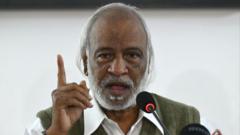A high-profile Bangladeshi delegation featuring political leaders, civil society members, and journalists has arrived in China for a 10-day visit focused on bolstering bilateral relations amid rising tensions with India. Led by Abdul Moyeen Khan from the Bangladesh Nationalist Party (BNP), the delegation aims to meet senior Chinese officials and members of the ruling Communist Party, highlighting China's strategic overtures in light of diplomatic strain between Bangladesh and India.
One of the key tensions stems from the exile of former Bangladeshi Prime Minister Sheikh Hasina in India, with Dhaka requesting her extradition, which India has thus far denied. Khan described the visit as “a goodwill trip initiated by Beijing,” noting its uniqueness due to the diverse representation in the delegation, which includes student movement leaders who were instrumental in the recent political upheaval in Bangladesh.
Currently, the nation is under an interim government led by Nobel laureate Muhammad Yunus, who has vocally criticized India for its refusal to repatriate Hasina, facing numerous allegations including serious crimes. This visit to China follows a meeting earlier this year between Yunus’s foreign policy advisor and Chinese Foreign Minister Wang Yi, as both nations explore opportunities for deeper collaboration.
After years of Hasina's perceived pro-India stance, analysts suggest that China's increasing engagement with Bangladeshi factions—including Islamist parties—aims to fill the political vacuum left by India's limited interaction with the new government. As Bangladesh continues to rely heavily on China for military supplies, with 70% of military equipment sourced from Beijing, the deepening trade ties—amounting to roughly $24 billion—signal a potential pivot toward China.
While China appears poised to strengthen its foothold in Bangladesh, India has found itself in a precarious position, dealing with criticisms from Dhaka regarding its historical influence. Indian Foreign Minister Subrahmanyam Jaishankar has emphasized that the relationship between the two nations is ultimately up to Bangladesh, labeling some criticisms as “absolutely ridiculous.”
As tensions mount, the latest diplomatic developments indicate that Bangladesh may be navigating closer to alliances already seen in Sri Lanka, the Maldives, and Nepal, as regional power dynamics shift under the influence of both China and India.

















